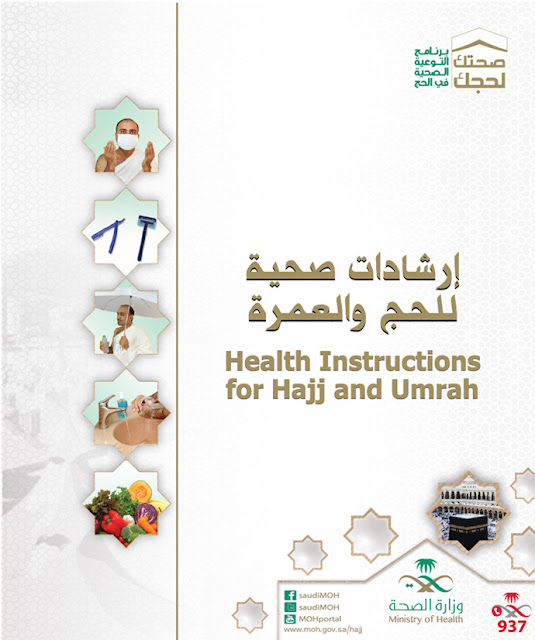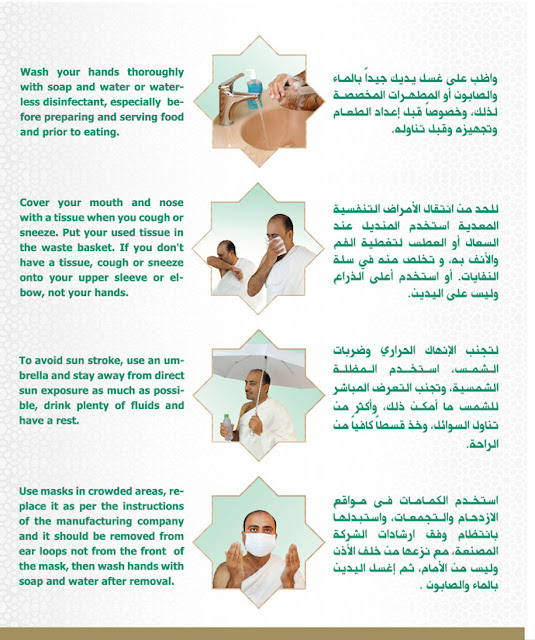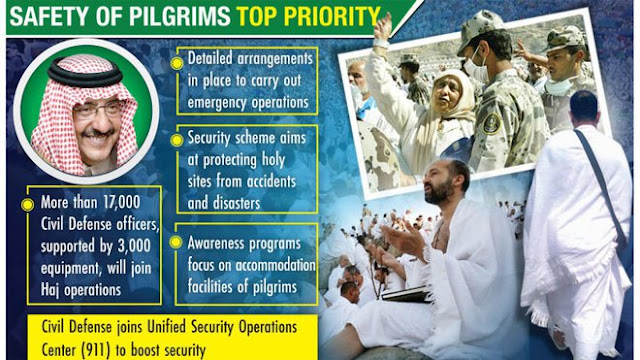Health Tips to Be Followed During Hajj:
First: Health Tips for Hajj and Umrah Pilgrims:
Pilgrims, when coming for Hajj or Umrah, are supposed to abide by a variety of health tips and guidelines, by following which they will be against infectious and communicable diseases, Allah willing. Following are some of such tips:
1. Hygiene and General Cleanliness Tips:
Maintaining personal hygiene, bathing regularly, and washing hands well by using water and soap, or other disinfectants used for handwashing, especially after coughing and sneezing.
Using handkerchiefs when coughing or sneezing by covering the nose and mouth, and then eliminating them in the trash. In case there are no handkerchiefs at hand, use the upper arms rather than hands.
Using a face-mask, especially in crowded places, and changing it every now and then.
In case there are no handkerchiefs at hand, use the upper arms, rather than hands, for covering the nose and mouth when coughing or sneezing.
Wash your hands well, using water and soap, or the hand-sterilizing gel, especially after bathing, after coughing and sneezing, before eating, and when coming back to your residence.
- Paying close attention to the oral and dental cleanliness.
- Eliminating wastes in the trash.
- Changing cloths with new ones every now and then.
- Paying close attention to the cleanliness of your residence, on a daily basis.
- Avoiding spitting on the floor, since it is a hazardous source of infection.
- Even though handwashing is always necessary, it is even more necessary during Hajj.
Don't spit on the floor. It is a hazardous source of infection transmission.
Face-masks are recommended at crowded and congested places, especially during circumambulation of the Ka'ba (Tawaf), stoning (Rajm), and walking between Safa and Marwa (Sa'i). They should be changed regularly (every six hours), or when dirty, in accordance with the guidelines provided by the manufacturer, along with washing hands with water and soap when taking them off.
2. Shaving and Haircutting Tips:
When shaving or haircutting, be sure to follow certain health tips and instructions to protect yourself against such infectious diseases as hepatitis (B) and (C) and AIDS. Such tips include:
- Choose a suitable barber, and never go to street barbers.
- Once-use shavers are recommended. Keep away from all other kinds of shavers, including the ones which have their razors changed after every shave.
- Never share others with such personal tools as the brushes used to remove hair, sponges, etc.
- Ask the barber to wash his hands well (by using water and soap) before shaving or haircutting.
- Remember that using your own shavers, and not sharing others with theirs, is the best way to protect yourself against the infection of hepatitis (B) and (C), and maybe AIDS.
3. Protection Against Food Poisoning During Hajj:
- Wash fruits and vegetables well before eating.
- Verify of the expiry date when buying canned foods and drinks.
- Keep away from the uncovered food, since it is exposed to insects and pollution.
- Wash your hands well before and after preparing food.
- Wash your hands well before and after eating.
- Cooked food should be eaten immediately after cooking, and, when need be, it could be kept in the fridge.
- Avoid storing cooked food in buses for long when moving from on Hajj site to another. This is one of the major triggers of food poisoning during Hajj.
- Remember that storing cooked food for more than two hours in the room/bus temperature may lead to the growing of bacteria causing food poisoning.
4. Tips for Protection Against Heat Exhaustion and Sun Strokes:
- Drink enough liquids (water, juices, etc.) regularly.
- Avoid exposure to the sun for long, and use an umbrella when necessary. Light colored umbrellas are recommended.
- Avoid making excessive effort, and keep to take sufficient sleep after performing each of the Hajj rituals, so as to restore your energy.
- Loose, light colored cloths are recommended. Don't use heavy cloths.
Areas of Frequent Heat Injuries: Heat injuries are frequent in these areas:
- Tawaf (circumambulation of the Ka'ba), especially at midday times.
- Sa'i (walking between Safa and Marwa), especially in cases of crowding and high temperature.
- Arafat at midday time.
- Mina (places of slaughtering the sacrificial animals and stoning), due to the long distance and congestion.
On the onset of the signs and symptoms of heat exhaustion or sun strokes (high body temperature, headache, dizziness, nausea, fatigue, thirst, and/or cramping of the abdominal and leg muscles), you should:
- Getting away from the sunny to a shady place.
- Cooling the body by cold water.
- Taking enough sleep.
- Taking antipyretics and painkillers when necessary.
- Heading for the nearest health centers in severe cases.
5. Tips for Patients with Chronic Diseases:
- Consult your doctor before setting out for Hajj, to assess your health situation.
- Take with you sufficient medications, and keep them properly.
- Take medicines on time.
- Adhere to the doctor's instructions, such as following a certain diet.
- Put on the wrist strap (or the information card), which shows your name, age, disease, the kind of treatment, address and contact information.
- You'd better tell your fellow pilgrims about your disease and proper medications, so that they can help you when necessity be.
- Avoid making too much effort, and use the Hajj legal concessions (like assigning someone to do the stoning ritual on your behalf), when the conditions of such concessions are true.
- Head for the nearest health center when necessity be.
- For more information on chronic diseases, check out the chronic diseases section in the Main Menu.
Second: Common Diseases during Hajj:
When performing the Hajj and Umrah rites, pilgrims are vulnerable to the diseases commonly associated with the Hajj season, including:
- Respiratory diseases.
- Gastrointestinal (digestive) diseases.
- Food poisoning.
- Dermatology (skin diseases)
- Dry eye.
- Sun strokes and heat exhaustion.
Respiratory Diseases:
Among the common diseases during Hajj are: Coryza (cold), seasonal influenza and bronchitis. They are transmitted through the droplets of coughing, sneezing or speaking.
Prevention and Reduction of Spread:
- Putting on face-masks, especially in crowded and congested places, and changing them every now and then, in accordance with the manufacturer's instructions.
- Using handkerchiefs to cover the nose and mouth when coughing or sneezing, and disposing them in the trash. In case there aren't handkerchiefs at hand, use, instead, the upper arms rather than the hands.
- Don't touch your eyes, nose or hands with the hands until after washing them well.
- Greeting others by shaking hands only.
- Don't drink ice water.
- Keep away from the air conditioner when sweated.
On the incidence of any of these diseases, follow these tips:
- Take enough sleep, and drink much liquids containing Vitamin C, such as lemonade and orange juice.
- Take antipyretics and painkillers.
- See a doctor on the onset of acute symptoms.
Tuberculosis and Hajj:
Tuberculosis is one of the diseases that could be easily transmitted during Hajj, because of the overcrowding, and because some pilgrims hail from places stricken by this disease. It is transmitted through the droplets of coughing, sneezing or speaking. Therefore, the Saudi Ministry of Health calls upon tuberculosis patients to put their Hajj off for later years, except in these cases:
- The result of spitting is negative, which indicates the diseases is unlikely to be transmitted.
- Tuberculosis is unable to resist antibiotics.
- The patient is a strict adherent to the medicine schedule.
In case you're suffering from continuing cough for more than two weeks, you have to undergo the necessary tests before traveling for Hajj, to be sure you don't have tuberculosis.
Prevention and Reduction of Spread of Tuberculosis during Hajj:
- Put on a face-mask, especially in crowded and congested places.
- Keep, as much as possible, away from overcrowded places.
- Use handkerchiefs to cover the nose and mouth when coughing or sneezing, and disposing them in the trash.
- Wash your hands well every now and then.
- Keep your residence always well ventilated.
- In case there is a fellow Hajj coughing all the time, tell the doctor of your Hajj Mission.
- In case you have tuberculosis, tell the doctor of you Hajj Mission to follow you up during Hajj.
- When getting back home, after Hajj, it is advisable to see your doctor to undergo the necessary tests, to ensure that you haven't been infected with tuberculosis during Hajj.
Using face-masks, especially in overcrowded places, and changing them every now and then (in accordance with the manufacturer's instructions) helps protect you from the infectious diseases transmitted through coughing or sneezing.
Digestive Diseases:
There is a set of diseases affecting the digestive system commonly associated with Hajj, such as diarrhea, constipation, nausea and vomiting. In order to avoid complications, you'd better adhere to the following tips and instructions:
Diarrhea:
- Keep away from fatty foods.
- Verify of the cleanliness of food, and cook it well, and don't buy foods from street vendors (See the Prevention of Food Poisoning).
- Drink much liquid to avoid dehydration.
- Head for the nearest health center if diarrhea persists.
- Constipation:
- Eat much fresh fruit and vegetables.
- Drink much liquid.
- Nausea and Vomiting:
- Don't eat and drink too much, especially fatty foods, until nausea and vomiting stop.
- Drink frequently to avoid dehydration.
- See a doctor in case vomiting is severe or persisting.
Food Poisoning during Hajj:
Many pilgrims are prone to food poisoning, especially the kind of poisoning caused by salmonella, which leads to acute inflammation in the intestine and colon, and entails such symptoms as stomach ache, headache, high temperature, diarrhea and vomiting.
Infection can be transmitted through:
- Negligence of cleaning vegetables before having them.
- Negligence of washing hands before preparing (or having) food.
- Negligence of cooking meat well.
- Drinking unpasteurized milk.
- Eating some foods uncooked (such as eggs), or some foods which contain uncooked eggs as an ingredient (such as mayonnaise), when kept in improper temperature.
- Eating “shawarma” without taking the necessary health precautions. It has been proven as the cause of many injuries.
Prevention:
- Wash your hands well before and after eating.
- Wash fruits and vegetables well before having them.
- Avoid keeping cooked food in buses when moving from one Hajj site to another. It is regarded as one of the major causes of food poisoning during Hajj.
- Keep in mind that keeping uncooked food in the room temperature for more than two hours leads to the growing of bacteria causing food poisoning.
- Cooked food should be eaten directly, or kept in the fridge when need be.
- Using pure water for drinking and cooking, and canned mineral water is preferred. In case you're unsure whether or not the water is pure enough, it should be boiled before use.
- Don't drink water from taps, or unclean ice cubes.
- Make sure that the milk you're having is pasteurized. Canned juices are preferred also.
- Verify of the expiry date of products, and be sure that the contents don't leak.
- Keep damageable foods (such as milk products and tuna) in the fridge, before and after opening cans.
- It is advisable to buy automatically packaged foods, and keep away from uncovered foods, or those prepared long time ago.
- Make sure that food is well cooked, to kill bacteria.
- Don't by foods from street vendors.
- You'd better eat fruits with thick crust, such as bananas and oranges, to be certain that they are clean and uncontaminated.
- Use clean utensils and plates. Paper plates and cups are preferred.
- Remember that when food has a different color or smell, this indicates that the food is spoilt and poisoned.
Remember that keeping uncooked food in the room temperature for more than two hours leads to the growing of bacteria causing food poisoning.
Dermatological Diseases:
Among the most common diseases during the Hajj is exfoliation (between thighs).
Prevention:
- Maintaining the personal hygiene and regular bathing.
- Using powder and other moisturizing cream when needed.
- Walking in strides to avoid exfoliation as much as possible.
- Keeping in-between thigh area clean and dry.
Xerophthalmia (Eye Dryness):
It is caused by the dust, dryness of the weather and direct exposure to the sun.
Prevention:
Using sunglasses.
- Being interested in bringing an additional pair of sunglasses in the event that you damaged or lost the other one; it is recommended that its rim be plastic.
- Not using contacting lens only after referring to your oculist.
- Using moisturizing eye drops after referring to your oculist.
Hajj General Tip:
- Not to kindle fires inside the tents and to use the places designated for cooking.
- Not to sleep on the pavements and roadsides for the pilgrims' safety.
- Not to get on top of the buses and vehicles.
- Not to jostle and shove during rush times, as this expose all especially the elderly and women for danger.
- To adhere to the directives issued by the Ministry of Health and other governmental bodies.
- To head to the nearest health facility when needed.
- To use toilet to defecate and urinate in order for the infectious epidemics not to spread.
- Not to slaughter the sacrifice in places not prepare for that such as the roads and by the tents. Hence, this exposes all for the diseases and odor and slaughtering should be in the designated places.
Chronic Diseases:
Generally speaking, the pilgrims injured with chronic diseases can easily and smoothly perform the rituals if they were to follow the following tips:
- To see the doctor before going on pilgrimage to evaluate your health conditions and prescribe the proper medicine when needed.
- To be interested in bringing an enough amount of the prescribed medicines, storing in a proper way and in a proper, easily reachable place.
- To take medicines on time and adhere to the doctor's other guidelines, with the diet included.
- To be interested in informing the nearest of you in the residence place and the doctor of the convoy with your disease and the medicines which you take to help when needed.
- To make a point of putting ring around the wrist or a card showing your name, age, nationality, the nature of your diseases, residence place, and contact numbers.
- To make a point of holding a detailed medical report on the illness case and the prescribed medicine.
- To adopt the legitimate license whenever its condition are met; if you felt that you are unable to continue some of the Hajj rites such as Jamarat-stoning: you can ask someone to do it instead.
- To stop doing anything when you begin to feel tiredness and overly strained, and take some rest.
- To head to the nearest health center if you did not feel well even after taking rest or the medicine.
- To follow the prescribed diet for you and keep away from all the bad nutritional habits, which could worsen your case such as having the tea , coffee, or fat foods to excess,
Remember that the Hajj is a precious opportunity to give up smoking, you should capitalize on successfully.
Sorce: http://www.moh.gov.sa/en/Hajj/HealthGuidelines/Pages/DuringHajj.aspx











